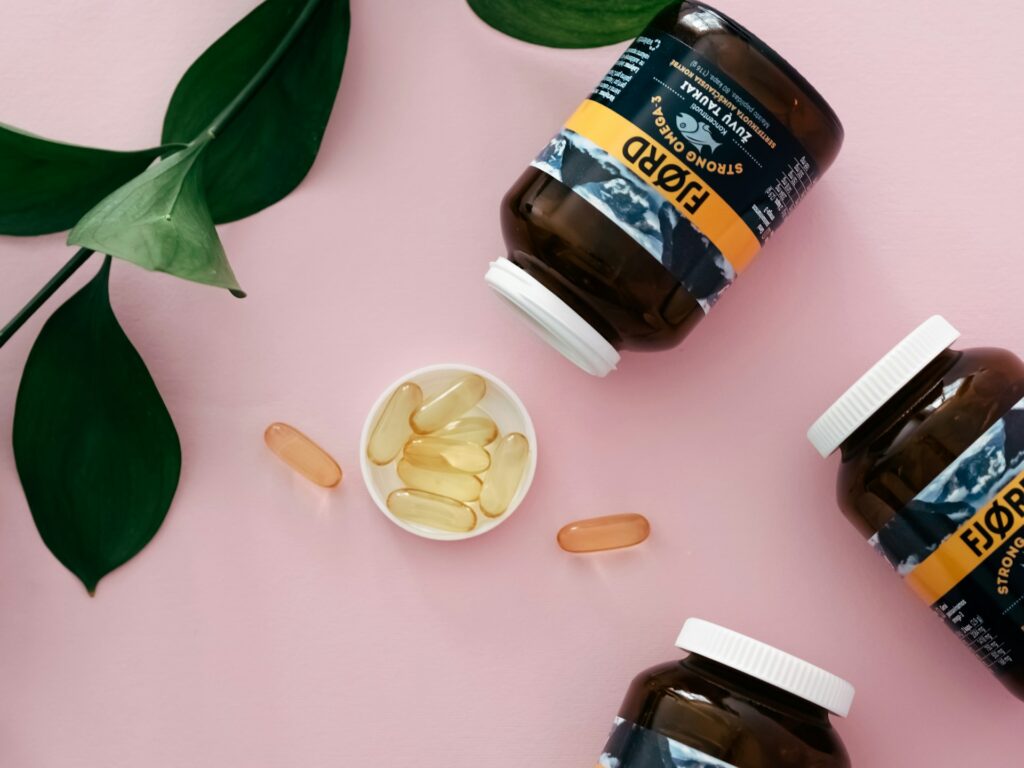Skin, as the largest organ in our body, plays an important role in our overall health and appearance. The healthy appearance and functioning of the skin are directly related not only to the care products applied externally but also to the nutrients we take from within. vitamins and other nutrients are widely used in the field of dermatology to treat conditions and maintain healthy skin. With antioxidant action and high nutritional power, studies show that skin vitamins can be used for both aesthetic issues and the treatment of specific conditions. In particular:
- Make skin firmer, brighter and more radiant;
- Contribute to acne control;
- Helps in the treatment of blemishes or melasma;
- Treat lesions and other dermatological problems;
- Help delay aging;
- Help with hydration.
- Skin barrier
By maintaining the skin’s balance, vitamins also help it perform its functions. The main one is the barrier function, which protects the body against external aggressions, such as toxins, sunlight, climate changes, and other conditions, maintaining its stability and integrity.
What are the main vitamins for the skin?
Vitamin A
Found in foods such as carrots, pumpkin, kale, oranges, and avocados, vitamin A is a powerful nutrient for skin health. It plays a role in cell renewal, melanin production, and collagen synthesis, helping to delay premature skin aging. Research shows that an adequate concentration of retinoids, derived from vitamin A, in the outer layer of the skin can have a protective effect against ultraviolet rays, acting to combat the oxidative damage caused by them.
Furthermore, it is also mentioned that vitamin A derivatives can help prevent the appearance of red spots on the skin and programmed cell death caused by exposure to UVB rays. However, evidence highlights that sun exposure is one of the factors that can contribute to the decrease in vitamin A in the body, emphasizing the need for adequate intake of this nutrient.

Vitamin B3 (Niacinamide)
Vitamin B3, or niacinamide, was first linked to improving skin in the 20th century by preventing pellagra, which includes dermatitis and red lesions. At the time, the condition caused thousands of deaths in the United States, until dietary supplementation of vitamin B3 was linked to a cure for the disease.
It is the one most often used in skincare products. Niacinamide works as a multipurpose ingredient that targets numerous skincare concerns by soothing irritations, minimizing pores, promoting an even skin tone, increasing elasticity, and strengthening barrier function. This vitamin is found in foods such as peanuts, chicken, salmon, wheat germ, and meat.
Furthermore, the evidence highlights many other benefits, such as
- Antioxidant action;
- Combats skin aging;
- Reduction of expression lines and wrinkles;
- Reduction in the appearance of hyperpigmentation;
- Reduction of oiliness, balancing sebum production;
- Smoothing out blemishes, acting as a whitening and illuminating agent;
- Expertise in the treatment of dermatological diseases and conditions such as lesions, acne, rosacea, and atopic dermatitis.
Vitamin B5 (D-Panthenol)
With anti-inflammatory and healing properties, D-panthenol, a precursor of vitamin B5, has been used in skin products for many years. Several studies indicate its potential for moisturizing and improving the skin barrier, preventing irritation, stimulating regeneration, and promoting wound healing.
Vitamin B5 is also used to treat acne and to reduce marks and blemishes caused by blackheads and pimples. It also promotes cell renewal and attracts and retains water, increasing the hydration, softness, and elasticity of the skin. Furthermore, panthenol can help in the formation of stronger hair and has an anti-seborrheic action, preventing the obstruction of scalp pores.

Vitamin C (Ascorbic Acid)
Vitamin C is well-known for skin health. It is one of the most widely used active ingredients in cosmetics because it acts as a powerful antioxidant, neutralizing free radicals that cause skin aging.
Furthermore, studies also show that the nutrient not only prevents and minimizes wrinkles and fine lines but also helps reduce scars lighten blemishes, increase natural hydration, and stimulate the production of collagen and elastin, improving firmness and combating sagging. Vitamin C also acts to protect keratinocytes from the effects of exposure to UV rays, enhancing the effects of sunscreen, combating the appearance of blemishes, and evening out skin tone.
Despite this, the efficient administration of vitamin C to the skin through topical application remains a challenge for science due to the high sensitivity of the substance to light and the instability of the molecule as a whole. Therefore, the use of substances derived from vitamin C is an alternative, since they also provide satisfactory results and guarantee better formula stability. Furthermore, formulations with a combination of vitamins C and E are even more effective. When purchasing cosmetics that promise to deliver the benefits of vitamin C, make sure they are reliable.
Vitamin D
Vitamin D is produced in the skin by the action of sunlight. Studies show that it has a variety of anti-aging and photoprotective effects on the skin, reducing damage caused to the skin by solar radiation and DNA damage, in addition to helping to prevent the appearance of wrinkles and expression lines.
It also plays an important role in the composition of the skin barrier and regulates the proliferation of keratinocytes, epidermal cells that synthesize keratin. There is still some promising evidence for the role of vitamin D in reducing the risk and progression of non-melanoma skin cancer. However, more studies are still needed before its supplementation can be guided in this condition.
Vitamin E
With high antioxidant power, vitamin E helps to increase the skin’s defense against free radicals and external aggressions, such as pollution, solar radiation, and sudden changes in temperature, among others. In addition to its photoprotective effect, the vitamin also acts as a hydrator, making it a great ally for treating sensitive skin and preventing skin aging.
vitamin E effectively strengthens the skin’s natural barrier to prevent accelerated signs of aging while protecting the skin from free radicals and sun damage. With its antioxidant and anti-inflammatory properties, this ingredient is an essential remedy to treat flushed and irritated skin for a calm and even complexion. Vitamin E, combined with vitamin C, may also reduce damage to human DNA caused by ultraviolet (UV) radiation

Are there vitamins for specific treatments?
The answer is yes. As we saw earlier, studies show that vitamins for the skin can perform several functions and, therefore, it is possible to include them in the daily care routine for the treatment of specific conditions.
Here is a list of the vitamins that are commonly used for each case
Vitamins for acne-prone skin
Acne is a skin condition that occurs when the sebaceous glands become inflamed or infected, causing blackheads, pimples, cysts, bumps, and scars. Vitamins used to prevent and treat these conditions include:
- Vitamin A: prevents pore inflammation.
- Vitamin B3: reduces oiliness and softens blemishes.
Vitamins for wrinkles and skin aging
Photoaging of the skin is mainly induced by ultraviolet (UV) radiation and its manifestations include wrinkles, irregular pigmentation with the appearance of spots, and loss of skin elasticity. It can also impact the dryness of the epidermis, resulting in a dull and dull appearance. However, evidence suggests that several components found in natural foods, such as fruits and vegetables, mitigate the development and symptoms of photoaging of the skin.
- Vitamin A: essential for cell renewal and collagen synthesis, in addition to the photoprotective and anti-aging effect.
- Vitamin C: combats free radicals that contribute to skin aging, in addition to acting in the production of collagen and elastin.
- Vitamin E: protects cells against free radicals and has a photoprotective effect.

Vitamins for skin with spots and lesions
Blemishes and other skin lesions can be related to many health conditions. Active ingredients with healing and lightning effects bring good results in the treatment of skin blemishes and lesions, often caused by acne, such as:
- Vitamin A: with healing action, it is used to treat blemishes caused by blackheads and pimples
- Vitamin B3: acts as a whitening and illuminating agent, reducing blemishes;
- Vitamin C: due to its anti-dark spot action, it can have a lightening effect on melasma and sun spots. Its functions can be enhanced in conjunction with vitamin E.
Vitamins for dry skin
For more hydrated skin, it is essential to reduce transepidermal water loss and strengthen the skin barrier against external agents. The following vitamins help to fulfill this role very well:
- Vitamin B3: responsible for increasing the synthesis of ceramides and lipids, repairing the skin barrier, and deeply hydrating, while balancing oiliness.
- Vitamin B5: excellent humectant, capable of attracting and retaining water on the surface of the skin, as well as functioning as an emollient that helps maintain adequate moisture in the visible layer of the skin.
- Vitamin E: has moisturizing and anti-inflammatory action, which helps to strengthen the skin barrier, in addition to being an important nutrient in combating oxidative stress.
Conclusion
The importance of vitamins in our diets has been acknowledged, as we know they possess health-optimizing qualities such as stabilizing our metabolism and growth. Therefore, the consumption of vitamins is vital for our overall development and our bodies functioning properly. They act on all layers and are important for characteristics such as nutrition, luminosity, and elasticity, in addition to helping to delay premature skin aging and assisting in specific treatments. Not only do the vitamins contain enriching properties, but they also target different skin concerns, making them an essential part of achieving your skin goals.


